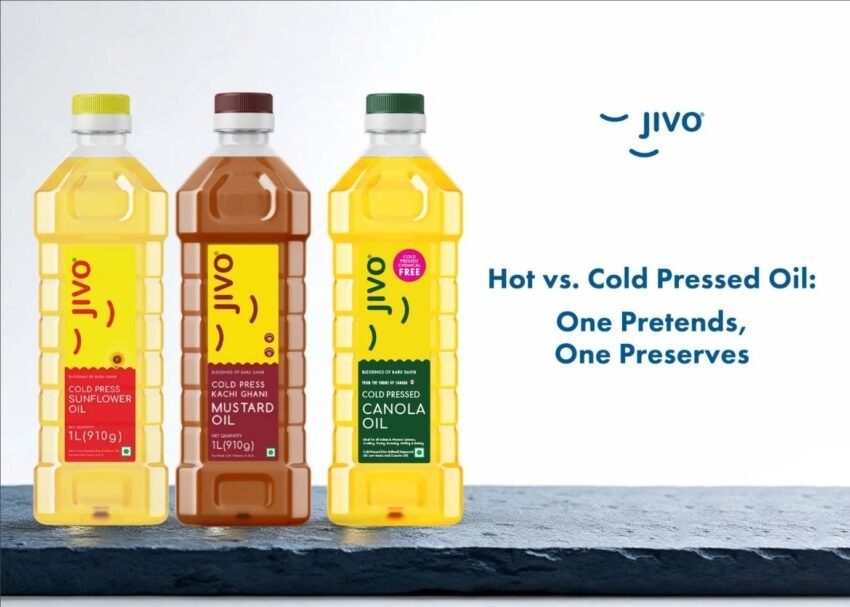It’s so confusing! Two terms you’ll often see on oil bottles are “hot-pressed” and “cold-pressed.”
But what do they mean, and why does it matter? Let’s explore both methods, with a special focus on why cold-pressed oils like those from Jivo are becoming the preferred choice for health-conscious cooks. Choosing the right cooking oil is more than just a matter of taste—it’s about health, nutrition, and how your food is prepared.
What Are Hot-Pressed Oils?
Hot-pressed oils are extracted by applying high heat to seeds or nuts before pressing. This heat increases the yield and makes the process quicker and more cost-effective. However, the high temperatures used during extraction can destroy delicate nutrients, antioxidants, and natural flavours. The oil is often further refined to improve its clarity and shelf life, but this can strip away even more beneficial compounds.
Key Points about Hot-Pressed Oils:
- Extracted at high temperatures (often above 100°C)
- Higher yield and longer shelf life
- Neutral flavour, but many nutrients are lost
- Often refined and may involve chemical solvents
- Commonly used for high-heat cooking and frying
What Are Cold-Pressed Oils?
Cold-pressed oils are made by mechanically pressing seeds or nuts at low temperatures, usually below 49°C. This gentle process avoids the use of heat and chemicals, preserving the oil’s natural nutrients, antioxidants, and authentic flavour. Cold-pressed oils are less processed, which means they retain more of the original goodness of the source ingredient.
Key Points about Cold-Pressed Oils:
- Extracted at low temperatures without chemicals
- Retain more vitamins, antioxidants, and healthy fats
- Rich, natural flavour and aroma
- Shorter shelf life due to minimal processing
- Ideal for salad dressings, drizzling, and low-heat cooking
Why Cold-Pressed Oils Are the Healthier Choice
The natural extraction method of cold-pressed oils means you’re getting an oil that’s as close to nature as possible. The process preserves essential nutrients like Vitamin E, omega fatty acids, and plant-based antioxidants, which are often lost in hot-pressed and refined oils. This makes cold-pressed oils a better option for those who prioritize nutrition and wellness in their daily cooking.
Brands like Jivo have set a benchmark by offering a range of cold-pressed oils—such as canola oil, olive oil, sunflower oil, and kachi ghani mustard oil—that are free from chemical additives and retain their natural health benefits. Jivo cold-pressed oils are perfect for those who want to enjoy authentic flavour and maximize the nutritional value of their meals.
Hot-Pressed vs. Cold-Pressed Oils: A Quick Comparison
| Feature | Cold-Pressed Oil | Hot-Pressed Oil |
| Extraction Temp | Low (<49°C) | High (>100°C) |
| Nutrient Content | High (antioxidants, vitamins) | Lower, many nutrients lost |
| Flavour & Aroma | Authentic, robust | Neutral, often bland |
| Chemical Use | None | Sometimes used |
| Shelf Life | Shorter | Longer |
| Best For | Salads, dips, low-heat dishes | High-heat cooking, frying |
The Bottom Line
While both hot-pressed and cold-pressed oils have their place in the kitchen, cold-pressed oils offer a clear advantage for those seeking natural nutrition and pure flavour. If you value health, taste, and authenticity, making the switch to cold-pressed oils—especially trusted options like Jivo—is a smart and wholesome choice for your everyday cooking.

